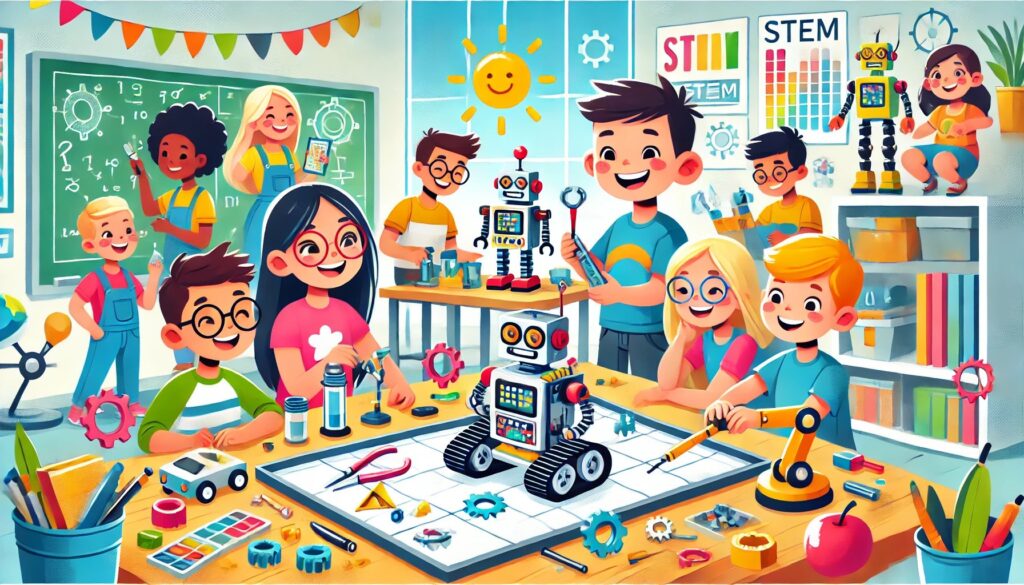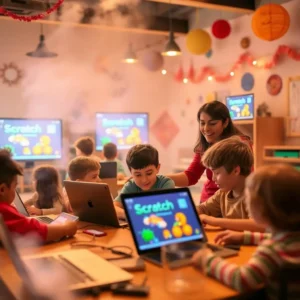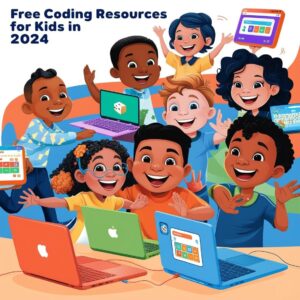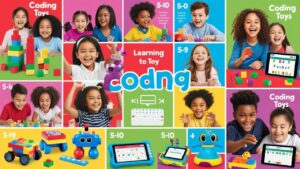- Why Is Tech Education for Kids Important?
- Key Benefits of Tech Education for Kids
- How to Start Tech Education for Kids
- Tools and Platforms for Tech Education
- Essential Tech Skills for Kids
- Challenges of Tech Education and Solutions
- How Parents and Educators Can Support Tech Education
- Engaging Kids in Tech: Practical Ideas
- Conclusion
In today’s rapidly evolving world, tech education for kids is essential for their personal and professional development. From coding and robotics to game design and AI, technology plays a central role in shaping the future. By introducing children to tech education early, we not only prepare them for careers in emerging industries but also foster their creativity, critical thinking, and problem-solving skills.
This comprehensive guide will explore the importance of tech education for kids, practical ways to get started, and the best tools and resources for parents and educators.

Why Is Tech Education for Kids Important?
Building Future-Ready Skills
The world of tomorrow is being built today with technology at its core. By learning tech skills like coding, robotics, and programming, children are better prepared to take on careers that don’t even exist yet. Tech education for kids empowers them to innovate, lead, and succeed in a tech-driven world.
Fostering Creativity
Tech education nurtures creativity by encouraging kids to think outside the box. Activities like designing games, building apps, or constructing robots challenge kids to turn abstract ideas into tangible outcomes, promoting innovation and original thinking.
Enhancing Problem-Solving Abilities
Whether debugging a code snippet or figuring out how to build a functional robot, tech education for kids develops logical thinking and resilience. These skills help kids tackle complex problems methodically and find innovative solutions.
Key Benefits of Tech Education for Kids
Improves Academic Performance
STEM (Science, Technology, Engineering, and Mathematics) education improves understanding of subjects like math and science. Kids involved in tech-based activities are more likely to excel academically.
Encourages Teamwork and Collaboration
Tech projects, especially in robotics or game design, often require teamwork. Children learn to collaborate, communicate, and share ideas—essential skills for the workplace and beyond.
Boosts Confidence
Completing a tech-based project, like creating an app or designing a website, gives children a sense of accomplishment. This boost in self-confidence helps them tackle bigger challenges in the future.
Prepares for a Tech-Driven Future
As industries like artificial intelligence, machine learning, and data science grow, early exposure to tech gives kids a competitive advantage. Tech education for kids ensures they are future-ready.
How to Start Tech Education for Kids
Age-Appropriate Activities
- Preschoolers: Introduce interactive tech toys like Fisher-Price Code-a-Pillar or apps designed for toddlers to learn sequencing and patterns.
- Elementary Kids: Platforms like Scratch and Tynker teach coding basics in a fun, game-like environment.
- Teens: Dive into advanced programming languages like Python or Java, and explore DIY projects with Raspberry Pi or Arduino.
Incorporating Tech in Daily Life
Use everyday activities to teach tech concepts:
- Let kids explore weather apps to understand data visualization.
- Encourage them to build simple circuits or experiment with home automation tools.
- Show them how search engines work and teach basic cybersecurity concepts.
Tools and Platforms for Tech Education
Interactive Platforms
- Scratch: A free, block-based programming tool for beginners.
- Code.org: Features engaging coding challenges for kids of all ages.
- Tynker: Offers gamified coding lessons tailored to children’s skill levels.
Coding Toys
- Botley 2.0: A screen-free robot that teaches coding basics.
- Dash & Dot: Robots designed to make coding interactive and fun.
- LEGO Mindstorms: Encourages creativity while teaching engineering and programming.
Books for Kids
- Python for Kids by Jason Briggs: A great introduction to programming.
- Hello Ruby by Linda Liukas: Combines storytelling with coding basics.
- The Everything Kids’ Scratch Coding Book: A hands-on guide to Scratch programming.
Essential Tech Skills for Kids
- Coding and Programming
- Platforms like Scratch and Blockly for beginners.
- Python and JavaScript for intermediate learners.
- Robotics
- Hands-on kits like LEGO Mindstorms or VEX Robotics introduce engineering concepts.
- Game Design
- Platforms like Roblox Studio and Unity teach storytelling, coding, and design.
- Web Development
- Tools like WordPress or Wix enable kids to create their websites.
Challenges of Tech Education and Solutions
Screen Time Concerns
Balance screen time by setting limits and incorporating offline STEM projects. For example, combine coding sessions with physical activities like building models or circuits.
Accessibility Issues
High-tech gadgets can be costly. Use free platforms like Code.org and Scratch or affordable options like Raspberry Pi for budget-friendly tech education.
Maintaining Interest
Keep lessons engaging by relating them to kids’ interests. For example, kids who love gaming can learn game design, while those interested in storytelling can explore animation or app development.
How Parents and Educators Can Support Tech Education
Create a Safe Tech Environment
Ensure children have access to tech tools in a monitored, secure environment. Encourage exploration while teaching basic internet safety.
Encourage Curiosity
Support kids’ tech projects and celebrate their accomplishments. Be their guide as they explore new technologies.
Incorporate Tech in Family Activities
Turn learning into a family affair with activities like building robots together or experimenting with coding challenges.
Engaging Kids in Tech: Practical Ideas
- Host Coding Workshops: Arrange coding sessions at home or in the community.
- Join Tech Clubs: Local or online tech clubs provide opportunities for collaboration and learning.
- Family STEM Nights: Set aside time for hands-on STEM projects, like building circuits or creating simple apps.
Conclusion
Tech education for kids is about more than coding; it’s about preparing them to thrive in a tech-driven world. By combining creativity with structured learning, parents and educators can inspire the next generation of problem-solvers and innovators.
Are you ready to kickstart your child’s tech journey? Explore our recommended coding toys, STEM kits, and online platforms to get started today!





